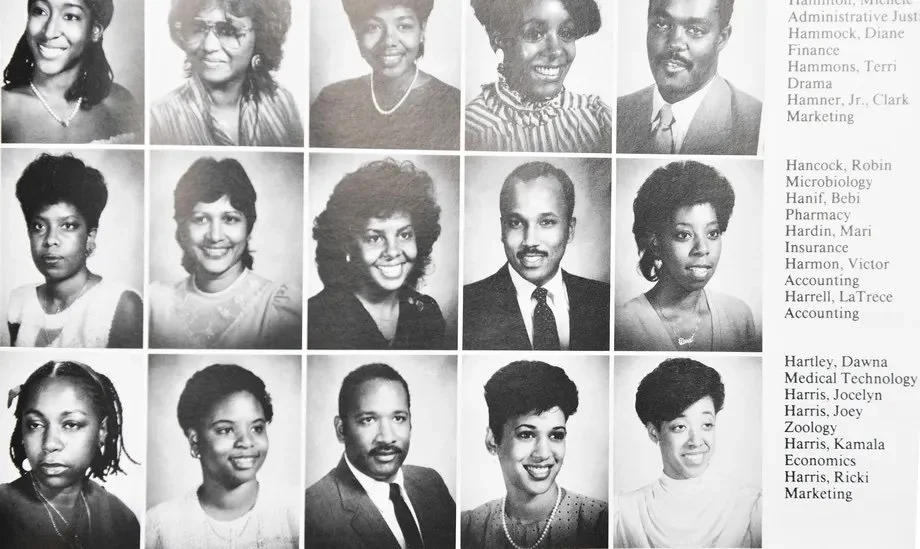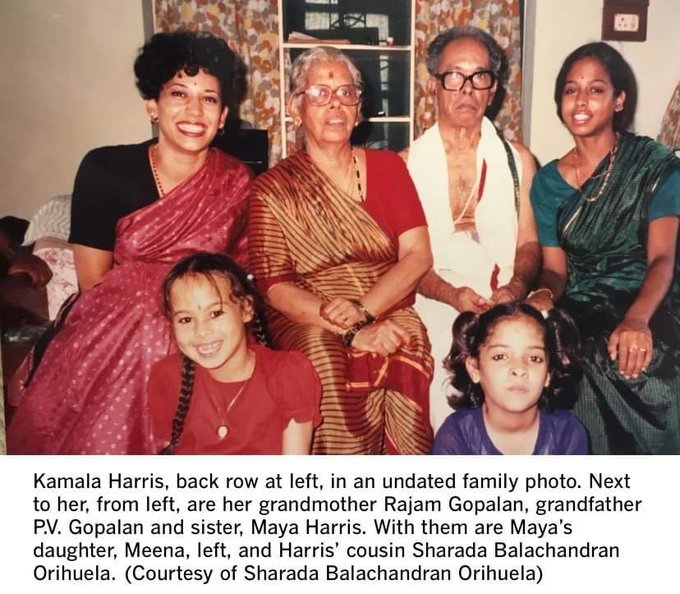Kamala Harris
Kamala Harris is the first woman, the first Black person, and the first Asian American to be the Vice President of the United States. A child of immigrants from India and Jamaica, she was also the first woman and the first person of color to be the District Attorney of San Francisco, the first woman and the first person of color to be the Attorney General of California, and the first South Asian person and the second Black woman elected to the US Senate.
Vice President Harris’s official portrait (via)
VP Harris’s mother, Shyamala Gopalan, at a civil rights march in Berkeley, CA (via)
“[My mother] knew that in America, her daughters would be treated, for better or worse, as Black women and Black children, and she raised us with a sense of pride about who we are. But never with a false choice – it was never to the exclusion of always being very proud and very active in terms of our Indian culture as well.”
“I was raised with a deep sense of pride in my cultural background. I mean this not as an indictment of anyone, but just speaking about myself – I’ve never had an identity crisis. I’m really comfortable in who I am. I didn’t go through some evolution about ‘who am I’ and ‘what is my identity.’ The frustration I have is if people think that I should have gone through such a crisis and need to explain it. But I didn’t. Maybe it’s being from the Bay Area and growing up in the Bay Area – there was such a cultural mix of people in the community in which I was raised. There was an understanding and an appreciation for that. It just wasn’t an issue for me. But being a candidate for public office does mean explaining who you are, and then it requires a little bit more explanation to help people figure it out. But it’s not as though it was an evolving consciousness for me.”
- From an interview with Frank Shyong and Jen Yamamoto on Asian Enough, June 2020
VP Harris with her parents (via)
With her mother (via)
“When I first ran for office that was one of the things that I struggled with, which is that you are forced through that process to define yourself in a way that you fit neatly into the compartment that other people have created. My point was: I am who I am. I’m good with it. You might need to figure it out, but I’m fine with it.”
- From an interview with the Washington Post, February 2019
With her mother (via)
With her sister, Maya, and her mother (via)
One of Senator Kamala Harris’s brightest childhood memories was walking down the beach hand in hand with her Indian grandfather.
Her grandfather, P.V. Gopalan, had served for decades in the Indian government, and his ritual, nearly every morning, was to meet up with his retired buddies and talk politics as they strolled along the beach in Besant Nagar, a seaside neighborhood in Chennai where brightly painted fishing boats line the sand and Hindu temples stare out at the sea. During her visits from the United States, Ms. Harris tagged along while the men discussed equal rights, corruption and the direction India was headed.
“I remember the stories that they would tell and the passion with which they spoke about the importance of democracy,” Ms. Harris said in a 2018 speech to an Indian-American group. “As I reflect on those moments in my life that have had the most impact on who I am today — I wasn’t conscious of it at the time — but it was those walks on the beach with my grandfather in Besant Nagar that had a profound impact on who I am today.”
- From the New York Times, August 2020
In a Howard University yearbook (via)
“For other people who can’t figure out ‘am I black enough,’ I kinda feel like that’s their problem, not mine. Maybe they need to go back to school to figure it out. And maybe they need to learn about the African diaspora and maybe they need to learn about a number of other things.”
- From an interview with Jemele Hill on Jemele Hill is Unbothered, July 2019
(via)
With her mother (via)
“And to the woman most responsible for my presence here today — my mother, Shyamala Gopalan Harris, who is always in our hearts. When she came here from India at the age of 19, she maybe didn’t quite imagine this moment. But she believed so deeply in an America where a moment like this is possible. And so, I’m thinking about her and about the generations of women — Black women, Asian, White, Latina, Native American women who throughout our nation’s history have paved the way for this moment tonight.”
- From her victory speech on Election Night 2020









